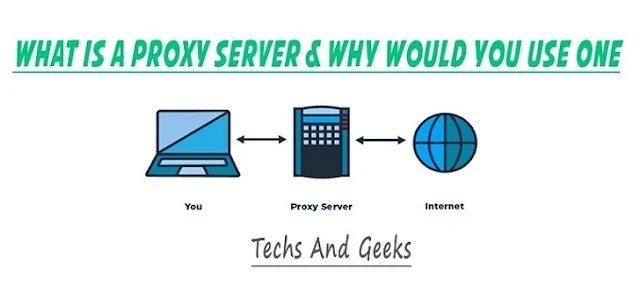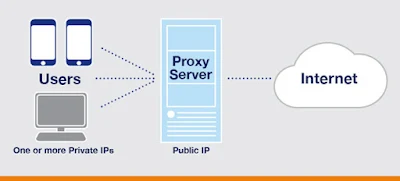What is a Proxy Server?
As the name implies, a proxy server is an intermediary between your PC or device and the Internet. This server makes requests to websites, servers and services on the Internet for you.
How Proxy server Works
Let's assume that you are at work, using a web browser to visit Techs And Geeks and your browser is set to use a proxy server.
After you type Techs And Geeks, the request is sent to the proxy server. The server then sends the request to the server where our website is hosted. The homepage of our website is returned to the proxy server which, in turn, returns it to you.
As a result, our website sees the proxy server as the actual visitor, rather than seeing you.
Now that you know the basics, let's see what are the benefits you get for using a proxy server.
Control Internet Usage
One of the most important reasons why proxies are widely used in corporate networks is that they provide control over what employees are accessing and using on the Internet. For example, many companies ban certain websites so that they are not accessed by employees during work hours. For example, they may ban adult websites, popular social networks or time wasting websites like facebook.com.
Forcing employees to access the Internet only through your company's proxy also means that you have detailed logs of all the websites & content they accessed, when, for how long, etc. Detailed usage reports are available about each employee and the company can easily identify misbehaving users.
Bandwidth Savings & Improved Speed
Another reason why companies use proxy servers is that it helps them save precious bandwidth. Proxy servers can compress traffic, cache files and web pages from the Internet and even strip ads from websites before they reach your computer. This allows companies to save bandwidth, especially when they have hundreds or thousands of employees, accessing mostly the same popular websites.
When a web page is accessed, a proxy server can store it and, when the next person requests it, it first checks if the page has changed. If it hasn't changed, it forwards the local copy without re-downloading the whole page. This both saves bandwidth for the company and makes the loading process faster for the next person that requests the same resource.
Privacy: Hide Your IP Address, Location & Other Information
When you have a direct connection to the Internet, when you load a website on the Internet, the server where it is hosted can see your IP address. With the help of this address it can approximate your geographical location. Also, the browser sends its user agent information and the website knows what browser you are using. On top of this, cookies are stored on your computer which provide further personal information.
Proxy servers can hide your IP address (if they are set to do this), can send a different user agent so that your browser is not identified and can block cookies or accept them but not pass them to your PC or device. Therefore, when using a proxy server, you can be a lot more anonymous than when using a direct connection to the Internet.
Proxy Servers Can Improve Security
Proxy servers may also have a role in improving security, especially when used in business networks. They can be set to block access to malicious websites that distribute malware and they can also provide encryption services so that your data is not easily sniffed by third-parties that want to get their hands on it.
They Provide Access to Blocked Resources on the Internet
A very popular use for proxy servers is the bypassing of Internet censorship. For example, countries like China or Iran censor access to many websites and services on the Internet. Users in those countries can use proxy servers to circumvent this censorship and get access to them.
Also, there are services which are available only in specific countries. For example, Hulu works only for users based in US and Japan. People in Europe can use a proxy server based in the US to access it.
Possible Security Problems Generated by Proxy Servers
Using proxy servers is not all about benefits and good stuff. They can cause problems like:
- When using unencrypted connections, the proxy server can alter the responses you receive, both in good and bad ways. For example, an infected or malicious proxy server can be used to load malware into your browser or redirect you to a phishing website.
- A proxy can alter the requests you make to a website or service on the Internet to generate results that meet someone else's intentions.
- A proxy server monitors and logs your activity. Therefore, it stores lots of information about you that can be used for identification at a later date.
- Depending on how it was configured, a proxy server can provide unencrypted data where encrypted data was previously provided by the website or service you are using. This can expose you to network sniffing and having others monitor what you are doing on the Internet.
Conclusion
As you can see, proxy servers can be great and they can also be a problem. It all depends on how they are configured, how they are secured and by whom they administered. A proxy server may provide all the benefits mentioned above or none of them. It all depends on how it was set up.
If You Have Any Doubts Kindly Ask Us On Comments Section And By Using Contact Page...








No comments:
Post a Comment